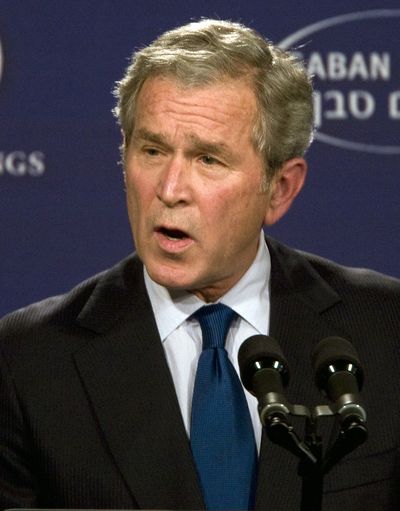Bush touts successes across Middle East
Region is ‘freer, more hopeful,’ president says

WASHINGTON – In a sweeping defense of his record, President George W. Bush asserted Friday that his administration is leaving the Middle East a “freer, more hopeful and more promising place” than when he took office.
Bush said his administration is close to success in Iraq, has moved to counter Iran’s nuclear program, and has “laid a foundation of trust” between Israelis and Palestinians.
“At long last, the Middle East is closing a chapter of darkness and fear, and opening one written in the language of possibility and hope,” Bush said in remarks to the Saban Forum in Washington, according to a transcript released by the White House.
The assessment comes six weeks from the end of a presidency that Bush’s team would like to portray as more successful than widely believed. But many experts don’t share Bush’s optimism.
“The net effect is an impression left by the Bush administration that the United States is unable to deliver and that when it tries, it tends to make matters worse,” wrote two experts, Martin S. Indyk, director of the Saban Center, and Richard N. Haass, president of the Council on Foreign Relations.
In a book released in advance of the forum that Bush addressed, the two veteran diplomats wrote that the new administration of President-elect Barack Obama confronts a perilous situation in the Mideast.
“Iran’s pursuit of nuclear capability and regional dominance, a strained U.S. military tied down in Iraq, a war that is going badly in Afghanistan, hostility toward U.S. involvement in the region – all create a dangerous, complicated and urgent policy environment,” they wrote.
However, in his remarks, Bush said that economic and political reforms are advancing across the Middle East.
“There are still serious challenges facing the Middle East,” he said. “Yet the changes of the past eight years herald the beginning of something historic and new.”
He said his administration refused to take the “easy option” of installing a friendly strongman when the U.S. invasion of 2003 toppled Saddam Hussein. Instead, the United States, at great cost, supported Iraqis as they “elected their own leaders and built a young democracy.”
A U.S.-Iraqi security agreement approved by both sides sets “a framework for the drawdown of American forces as the fight in Iraq nears a successful end,” he said.
He acknowledged that the Iraq war, now lasting nearly six years and costing more than $650 billion, has been longer and more costly than he expected. But he did not attempt to explain early predictions by the top officials of his administration officials that the war would be shorter and much less costly.
However, he alluded to the frequent criticism that his administration sought to justify the invasion by connecting Iraqi dictator Saddam Hussein to the Sept. 11 attacks.
“It is true, as I have said many times, that Saddam Hussein was not connected to the 9/11 attacks,” Bush said. “But the decision to remove Saddam from power cannot be viewed in isolation from 9/11.”
Top administration officials, however, especially Vice President Dick Cheney, repeatedly pointed to alleged ties between Hussein and al-Qaida. A bipartisan Senate panel in 2006 concluded there was no connection between Hussein and Sept. 11.
Emphasizing the positive on Iran’s nuclear program, Bush said the Tehran government is facing “greater pressure from the international community than ever before.”